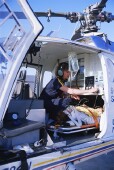- Could Your Grocery Store Meat Be Causing Recurring UTIs?
- Are You Making This Expensive Thermostat Error This Winter?
- Recognizing the Signs of Hypothyroidism
- 10 Strategies to Overcome Insomnia
- Could Artificial Sweeteners Be Aging the Brain Faster?
- Techniques for Soothing Your Nervous System
- Does the Water in Your House Smell Funny? Here’s Why
- Can a Daily Dose of Apple Cider Vinegar Actually Aid Weight Loss?
- 6 Health Beverages That Can Actually Spike Your Blood Sugar
- Treatment Options for Social Anxiety Disorder
Blood Transfusion During Flight to Trauma Center Boosts Survival: Study


Receiving a blood transfusion while being flown via helicopter to a trauma center raises a patient’s chances of survival, a new study suggests.
Researchers analyzed five years of data to compare outcomes among 240 patients who received in-flight blood transfusions and 480 who did not. The patients were transported to the University of Pittsburgh Medical Center, which has 18 helicopter bases in Pennsylvania, Ohio and Maryland.
“After matching patients for how badly they were injured at the scene, the people who received blood transfusions while they were on the helicopter were more likely to survive on the first day after being injured,” study author Dr. Joshua Brown said in a journal news release.
He said that transfused patients were also, “less likely to be in shock when they showed up at the hospital; and didn’t need as many blood transfusions at the hospital just because they did get that first blood transfusion in the helicopter.”
The study, published online Feb. 11 in the Journal of the American College of Surgeons, is the largest so far to examine resuscitation protocol used by the U.S. military in Iraq and Afghanistan. While it showed an association between in-flight transfusion and improved survival, the study was not designed to prove cause-and-effect.
Severe bleeding is a major cause of death in trauma patients. Receiving a blood transfusion as soon as possible has been shown to reduce the risk of death, and this practice is on the increase in the United States.
But there are certain challenges in providing transfusions to trauma patients during airlifts, Brown noted.
“The blood needs to be refrigerated, the helicopter base must have a freezer, and the helicopters must have coolers when they’re actually out on a mission to keep the blood at an appropriate temperature,” he explained.
More information
The U.S. National Heart, Lung, and Blood Institute has more about blood transfusion.
Source: HealthDay
Copyright © 2026 HealthDay. All rights reserved.










